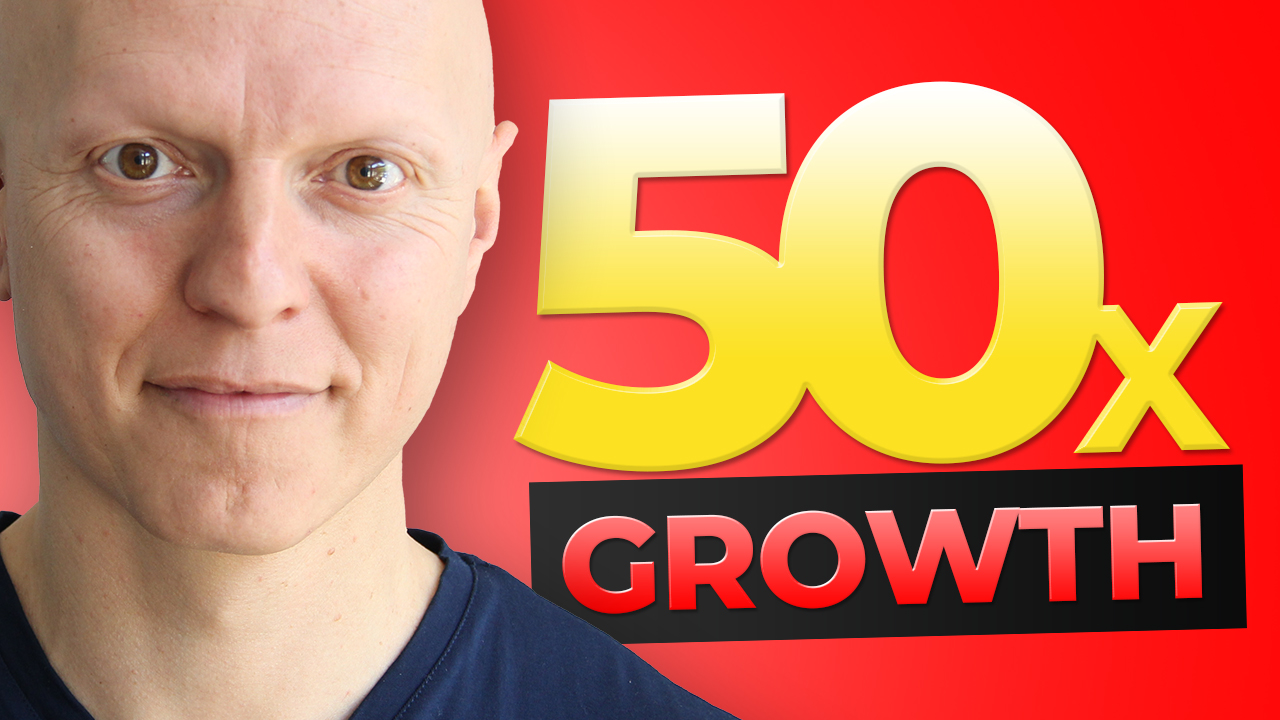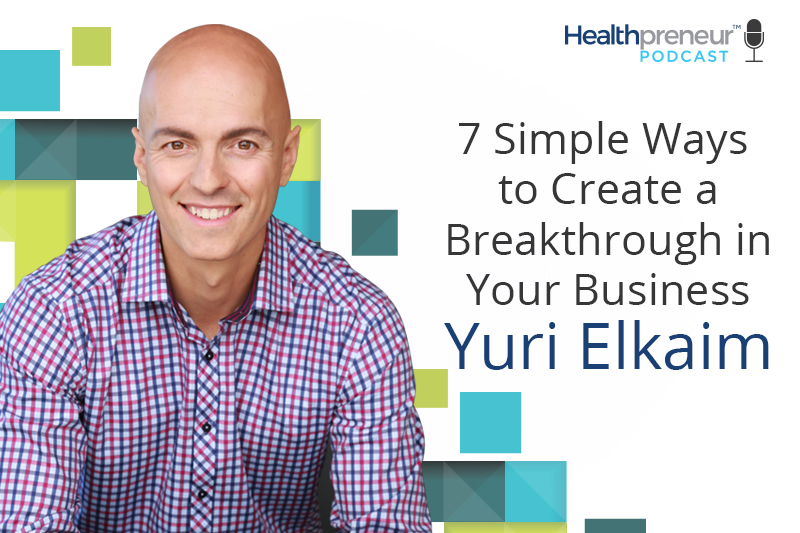Are You a Polygamous Entrepreneur?

Today for our solo round on the Healthpreneur Podcast I’m going to be talking about polygamous entrepreneurship. If you’re confused as to what the heck this means, I’ll explain.
Polygamous entrepreneurship is something that almost every entrepreneur deals with, and it’s often referred to as the shiny objecy syndrome. As entrepreneurs, we tend to be creative people, we like to get stuff going and create new things. And while that is an inherently good trait, it can often stab us in the back.
I’m going to talk about how you can learn to take a step back, avoid the rabbit holes, and focus on your business. You need to be clear on what direction you want to go with your business and develop that roadmap to get you there. If you don’t do that, you’ll end up wasting time getting distracted by all of the shiny objects out there. I can’t stress how important it is to make sure you’re in the proper mindset when it comes to your business, and I want to help you get there and stay there.
In this episode I discuss:
1:00 – 4:00 – The story of my son, Oscar
4:00 – 5:30 – You need a roadmap, and you need to stick to it
5:30 – 7:00 – How I used this knowledge when starting Healthpreneur
7:00 – 8:30 – Why I don’t have Instagram or Facebook on my phone
8:30 – 12:30 – The key word is predictable
12:30 – 16:00 – Businesses become boring
Transcription:
Ladies and gentlemen, welcome to the Healthpreneur Podcast. Yuri, here, and on today’s episode we are going to be speaking about polygamist entrepreneurship.
Yes, that’s right. You’re probably asking yourself, “What the heck does that even mean?” Well, sit tight, because I’m going to share with you exactly what that is and why it’s important for you to understand—whether you are a monogamist entrepreneur or a polygamist entrepreneur.
And I’m not trying to infer anything with the rest of your life and your preferences and stuff. That’s none of my business. But what I’m talking about, as it pertains to your business, can really help you or it can sidetrack you.
The story of my son, Oscar
One of the biggest challenges that a lot of us entrepreneurs face is chasing shiny objects. I want to share a little story with you about my son, Oscar. So Oscar, as of this recording, is seven years old and we recently had a parent-teacher interview with his grade one teacher.
His grade one teacher was somewhat concerned because he was not able to sit still and focus in class. And like with all great establishments, they’re thinking there’s something wrong with him.
I’m just sitting through this nonsense and thinking to myself, “I do not give a shit.” Because, you know what? The very fact that you want him to fit into a box and sit still and not focus is crushing his soul. It’s not who he is at his core.
He’s a creative person, he’s very artistic, he needs to be moving around and for the school system to say, “Your son or daughter, no matter who they are as individuals, must fit into this mold,” is just another ridiculous example of why the school system is nonsense.
Anyway, we have tendencies as creatives, right? Because I think most entrepreneurs are creatives. We like to start stuff, we like to get stuff going, we like to create, and the flip-side of that is this challenge that we have to see things through and really focus on one thing at a time.
If you can resonate with this, you’re not alone. There’s nothing wrong with you. You don’t have to have Ritalin or anything like that. The reality is that’s just the way our brain is wired.
So, with that said, does that mean that we should be going out and becoming polygamist entrepreneurs? Should we be going out and chasing all sorts of different shiny objects, instead of focusing on the one track that we’ve committed to?
You see how I brought those two together there? You like that?
You need a roadmap, and you need to stick to it
Here are my thoughts on this. I think a lot of times we get into polygamist issues within our business—chasing a lot of different things—because we don’t have a proven or a certain roadmap that we’re following.
We’re not clear on the direction in which we’re moving. We don’t have a simple plan of action, therefore we feel overwhelmed and because we feel overwhelmed, we have no certainty. And when we have no certainty, then we’re looking for all sorts of different things.
We feel good, initially, when we buy that latest course or we jump onto this latest telesummit or whatever it is, and then afterwards we look back at ourselves, we’re like, “Wow, that really got me off track. That really sucked away some of my time that I could have been using to focus on my initial course,” in terms of the track that you were on, “and now, I don’t even know what I’m doing anymore.”
My desire for you is to not squash your creative genius and not squash the ability to start things, but my challenge and my encouragement for you is to really figure out what your business model looks like.
Okay? What does it look like?

Everything that we do in business is a reflection of our philosophy about our business, very much like everything we do with our health is a philosophy of how we see ourselves in this world living healthy or not.
I’ve been online since 2006 and I’ve done everything you can think of. From affiliate marketing to big product launches to paid traffic to content marketing. You name it, we’ve done it all.
How I used this knowledge when starting Healthpreneur
A lot of the stuff we’ve done has come as a result of not having clear focus on what the most important thing was to get done. With Healthpreneur, I started this business two years ago now, and I said, “Knowing what I know now, what would I do differently? Knowing the mistakes I’ve made, knowing the successes that we’ve had, how would I want to start a business knowing all this stuff?”
And that’s exactly what we did.
Actually, to be very honest with you, I still fell into some of that old mindset like building lead magnets, ascension funnels, and we actually built a couple courses, too. Then I started thinking to myself, “No, it’s too complex. There’s too much stuff going on. We’re gonna simplify it even more.”
So we came back to the drawing board, trimmed away the fat, and just went bare bones. We said, “Listen, here is the business model.” And our business model, there’s no secret to it. There are the little nuances that make it work, but at a surface level it’s simple.
We drive traffic from Facebook—we pay for traffic—to a webinar. From the webinar, we provide some amazing content and then we invite the right people to jump on the phone with us to see if they’re a good fit to work together. At the very minimum, we offer them some great insight into how they can take their business to the next level. That’s all we do. That’s it, okay?
The only other thing I do in my business outside of that is this. This podcast. That’s the only thing we do.
Why I don’t have Instagram or Facebook on my phone
There’s no blogging, there’s no YouTube for Healthpreneur, there’s no Instagram stories. We have an Instagram feed, right? It’s populated with the newest episodes from the podcast and so forth, but I don’t do any of that stuff.
I actually don’t even have Instagram on my phone anymore, nor do I have Facebook on my phone—and the reason for that is because I know that if I start seeing what other people are doing, I’m going to start to gravitate towards thinking like I should be doing some of that stuff.
So, I really recommend spending more time in introspection than comparison. If you are spending a lot of your time on social or if you listen to a thousand different podcasts, what’s gonna happen is that things are going to start seeping into your brain that will make you think you need to start doing this or that or X, Y, and Z.
That’s all good, right? I mean, there’s a lot of different ways to scale the mountain.
But what you need to be extremely clear on is what is your business model. What is the track that your train is on?
If you’re a train on a track, you can’t jump off that track to another train track. You need to stay on the track and when you don’t, the train crashes.
That’s how that happens.
The key word is predictable
So you need to be very clear, if you’re not already, about what your business model looks like. And, specifically, there are three systems that we help our clients get extremely clear on; attract, convert, and deliver.
Those are the only three systems in a business. Okay?
How are you attracting leads? How are you converting those leads into paying clients? And how are you delivering an amazing result for those clients?
Now, within those three parameters, there are a lot of different things you could be doing.
How do we attract leads? Well, we publish a daily piece of content on our blog and, hopefully, some of the people opt in. Or we put out a daily podcast, or we buy Facebook ads, or whatever it is. Right?
But the key thing that I’ve realized, having spoken with a lot of health coaches and practitioners and trainers and business owners in our space, is that they don’t have a predictable way of generating leads. They don’t.
So, they’re doing all sorts of manual prospecting—they’re part of 20 Facebook groups, and they’re popping in here and there adding some authority and maybe building a couple relationships through private messenger.
And that’s fine, a lot of that stuff works and I would recommend it. But it cannot be the primary focus of your lead generation.
If you don’t have a predictable way—and the keyword is predictable—of generating leads, your business will always suffer. And when that happens, when you don’t have that structured system and predictability, that’s when we start having affairs within our business.
We’re sort of thinking, “Hey, you know what? That new thing over there looks pretty hot. I’m gonna give that a shot,” and all of a sudden you’re having a one-night stand with this latest product launch video.
You go down that rabbit hole and you’re like, “Oh, my God. Shit. I’ve gone a little bit too far here. I’ve completely lost my data,” or, “I’ve completely lost focus off what I was actually doing.”
You need to stay focused on your track, and in order for you to do that you have to be clear about what that track is. And in order for you to know what that track is, you have to be clear about what your vision is and what you really enjoy doing.
I love working closely with people—ideally in person—and I love teaching and coaching and helping people implement strategies and systems in their business that are gonna free them to do what they love doing most, which is teaching, coaching, and serving their clients. Not setting up funnels and writing sales copy and optimizing all that nonsense.
I’ve built our entire business around that. Everything we do leads to that, nothing else.
We’ve taken out all of our lead magnets, all of our courses, because that stuff moves us further away from the real deal which is really serving people at a deep level. That’s why I have no need or desire to even learn about what anyone else is doing with their business.
Sure, there are a couple of nuances with how we can improve a few of the moving pieces in our current business model, but I have no intention of doing product launches ever again. I don’t care about doing joint venture or affiliate stuff.
I don’t need to do any of that stuff. I don’t take part in summits, necessarily. There’s a lot of stuff I don’t do and I say no to very easily because I know exactly, “All I need to do is more of this,” and the results speak for themselves.
I hope and I pray that you have the level of clarity and certainty in your business that allows you to put the blinders on and stay in your lane.
One of the things I’ve found that happens—and I’m guilty of asking this question sometimes, I’ll ask someone, “Hey, what’s new and exciting in your business?”
That’s actually a very bad question to answer and ask because normally what people will answer is, “Oh, I’ve got this new thing we’re working on or this thingamajig,” and that’s a challenging answer.
Because, again, we want to create new stuff. Right? That’s part of who we are.
But at the same time, I’m gonna ask you this, “Are you creating new stuff and chasing all this stuff because it’s entertaining? Because your business is too boring for you? Or is it actually producing results for you in your business?”
If it’s not producing results for you in your business—and when I say results I mean is it impacting your clients in a big way, is it making you a lot more money, is it freeing up your time and, obviously, do you enjoy doing it?
If the answer to any of those questions is no, then you probably shouldn’t be doing it.
But, again, you might enjoy spending time in Canva creating banners, but is that impacting your clients? Is it making you more money? Is it freeing up your time?
No. It’s probably not in your unique genius, so you can just give that off to someone else.
Businesses become boring
Business inherently becomes boring. It inherently becomes boring as you grow it and I think that’s part of the reason why so many people are willing to jump ship and jump into bed with other sorts of shiny objects that seem more attractive at the time.
But just like with your marriage, if you’re committed to this and you know this is the right person for you—you commit to it! You go deep, you focus on this one person, you focus on this one business model, and no matter what, I guarantee you, if you stick to whatever it is you’re doing, you will succeed.
Now, you might succeed a lot faster by following what we teach—because it’s really the fastest method I’ve ever seen to grow a business—but it might take you ten years and you still might succeed doing something else.
Like, “Hey, I’m gonna make my blog an authority website.” Terrific. I wish you all the best and I’ll talk to you in five years when you’re finally getting some traction. Nothing wrong with that, but you have to be realistic about what’s in it, and are you in it to win it?
If you’re going to do the blogging thing, if you’re going to do the content marketing, go full into content marketing. If you want to sit behind your computer, you don’t like interacting with people, then that’s cool. But if you love coaching, teaching, and serving clients and you want to get in front of them in a way that’s leveraged and can impact their lives, make you a lot more money, free up your time, then that business model is not going to work.
If you want to become a millionaire and you’re selling e-books for $10, well, good luck. I mean, I did that and it sucks. You need a massive amount of traffic and with tiny margins like that, you’ve got to be maniacal about your data.
And that’s not a lot of fun because now you’ve become an info marketer, where all of your time is spent setting up ten funnels to split test, all sorts of different stuff—instead of actually spending more of your time doing what you love.
So spend time in your unique genius, delegate the rest. Don’t even touch the rest. That’s my advice.
So we’ll wrap it up there. Okay? A little food for thought for you today, a little word of encouragement, a little kick in the butt to enjoy your business—but don’t be distracted by what is entertaining versus what is actually fulfilling and productive.
So, with that said, if you’d like to discover how you can implement the business model that I’ve been referring to, what we call the “perfect client pipeline,” I’d love to walk you through that in our awesome training called the Seven Figure Health Business Blueprint.
You can register for the training absolutely free over at healthpreneurgroup.com/training, and once you’re over there just choose whatever time is best for you and you can join me for that training.
I’ll walk you through, in about 75 minutes, the exact game plan. At the very minimum, you’ll have so much more clarity on what to do. I’m telling you, it’ll save you so much frustration just knowing this and knowing that there’s a simpler, better solution out there to grow your business and really transform people’s lives at a much deeper level than trying to have them buy your $10 e-book.
Not that I’m saying that’s a bad thing, but it’s a lot more rewarding.
Anyway, if you’d like to join me for that, you got the URL and that is all for me today. So, I want to thank you so much for joining me once again on the show. We have some great interviews coming your way this week, so don’t go anywhere.
If you haven’t yet, subscribe today to the Healthpreneur Podcast on iTunes and continue to go out there, be great, and do great and I’ll see you on Wednesday.
If you enjoyed this episode, head on over to iTunes and subscribe to Healthpreneur™ Podcast if you haven’t done so already.
While you’re there, leave a rating and review. It really helps us out to reach more people because that is what we’re here to do.
What You Missed
On the last episode, we explored explore the world of online coaching and fitness with Jen Oliver, who helps transform mothers into mindful, self-loving, and balanced women through her company, Love Fitmama.
If you’re a busy mother who’s feeling pain from a work/life imbalance, this episode will provide you with some invaluable information. If you find yourself feeling pain, stress, or overwhelm, you’ll discover that you really don’t have to.
It is possible to balance a career and a family, and Jen has dissected the formula to do so while caring for yourself at the same time. Jen has learned by experience that the “grind” doesn’t work, and a shifted mindset is critical to pain-free life. As a parent, I related to Jen in so many ways. I think you will, too.
Related posts
October 20, 2017
How Jennifer Fugo Travels The World While Helping Women Conquer Gluten
If you’re involved in the gluten…





